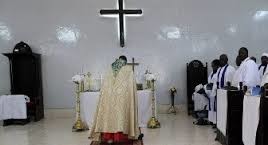The Head of Sudan’s Council of Churches and another church leader were summoned by Sudan’s National Intelligence and Security Services (NISS) shortly after holding a press conference in Khartoum where they called on the government to reconsider its decision to demolish church buildings.
Following the press conference on 11 February, the Sudanese security agents ordered Rev. Mubarak Hamad, the Chairman of Sudan Council of Churches to report to their office daily from 8:00 am to 9 pm.
That requirement was lifted on 26 Feb 2017 after they ordered him not to speak publicly about persecution of Christians and the demolition of church buildings unless authorized by the security.
The Sudanese government plans to demolish at least 25 churches, saying the churches were built on illegal lands, but church officials say they legally obtained the lands and have title deeds.
NISS warned Hamad not to report about the demolitions and persecution of Christians in Khartoum. “They told me not to talk about the demolition of churches or the two church leaders who are in jail,” Hamad told Radio Tamazuj.
He added that church leaders have become targets in the crackdown of Christians in Khartoum, saying two church leaders have been sentenced to 12 years in prison for charges of espionage.
The security agents also ordered another Christian leader to report daily at their offices for interrogations over matters to do with church demolitions.
Milad Musa, a member of the Sudanese Church of Christ is required by the security service to report himself to their offices from 6 am in the morning to 12 am since 15th February 2017 for criticizing the demolitions plan.
“Sometimes there is food but many times there is no food in the custody,” said Musa.




